- Home
- Greg Van Eekhout
Kid vs. Squid
Kid vs. Squid Read online
KID VS. SQUID
GREG VAN EEKHOUT
CONTENTS
Cover
Title Page
Dedication
CHAPTER 1
CHAPTER 2
CHAPTER 3
CHAPTER 4
CHAPTER 5
CHAPTER 6
CHAPTER 7
CHAPTER 8
CHAPTER 9
CHAPTER 10
CHAPTER 11
CHAPTER 12
CHAPTER 13
CHAPTER 14
CHAPTER 15
CHAPTER 16
CHAPTER 17
CHAPTER 18
CHAPTER 19
ACKNOWLEDGMENTS
Imprint
For Mama and Papa,
for giving me all those books
and raising me and stuff
CHAPTER 1
Dear Thatcher,
I’m off conducting some very important museum business. Here’s your to-do list. And remember, a ship can’t set sail without wind, so make sure you eat something.
—Uncle Griswald
TO-DO LIST
1. Water the plants
2. Feed Sinbad
3. Dust the shrunken heads
4. Clean the What-Is-It?? (but don’t open the box!!!)
5. Have some lunch (pizza in fridge)
So far I’d gotten as far as Number Two on Uncle Griswald’s list. Sinbad the tabby was lapping up tuna-liver mix in my bedroom, which was really just a hammock in the closet where Griswald kept his mops and buckets. I tried not to mind so much. Believe me, there were worse places in the museum. For example, most of it. I couldn’t even walk to the bathroom without passing a glass case containing four tiny severed heads with fins for ears. Dead-eyed, they grinned fiercely, daring me to touch them with my feather duster.
Me, Thatcher Hill, versus the shrunken heads. This was my summer vacation.
I was supposed to be spending the time between sixth and seventh grades traveling through Asia with my parents. They owned the biggest squirt gun distributorship in Arizona, and they were touring overseas squirt gun factories in exotic and interesting places. But one of my classmates had caught some kind of kangaroo rat virus, and even though I didn’t get sick, I was exposed and wasn’t allowed to travel out of the country. I’d begged my folks to let me stay with friends in Phoenix, but they decided I should be watched by family. My closest relative was Mom’s uncle, my great-uncle Griswald, so they shipped me off to live with him in Los Huesos, California.
I’ll have plenty more to say about Los Huesos later. Right now, I want to tell you about Uncle Griswald’s museum.
Maybe you’ve been to a museum on a school field trip. Maybe there were dinosaurs or old paintings or statues of naked people inside. Griswald’s museum wasn’t like that. Professor Griswald’s Museum of the Strange and Curious and Gift Emporium sat crammed on the Los Huesos boardwalk between a hot dog stand and a tattoo parlor. Here, Griswald displayed things that looked like they’d been dredged up from a deep ocean trench where all the ugliest sea creatures live because it’s dark and nobody has to look at them there. He had a fish with a green handlebar mustache in a jar. He had a hand with suction cups and eyeballs. And a thing that looked half-fish and half-monkey, labeled the Feejee Mermaid. A tiny, withered man with pants made of sardines. An octopus with sneakers on the ends of its eight arms. The shrunken heads. And so forth.
He even kept a mummy in a glass-lidded sarcophagus, resting on a pair of sawhorses. It was the color of beef jerky, with dark black squiggles down its arms that looked like sea horses. Griswald said the squiggles were tattoos. I thought they were done in Magic Marker. The mummy had no head. Mummies with heads cost a lot. He’d found this one washed up on the beach, which was his favorite way to acquire exhibits, since it was free.
Places like my uncle’s used to be called dime museums, because marks (another word for “customers,” or “suckers”) were charged a dime to gawk. Uncle Griswald charged three dollars.
I gave the shrunken heads a quick pass with my feather duster and moved on to the What-Is-It??
So, what was it?
It was a barnacle-encrusted wooden box with swirly grain that reminded me of ocean waves. One side had a window of bubbly green glass, and through the glass, you could almost see a face looking back at you: pale eyelids, a sharp blade of a nose, and a wide, thin-lipped mouth turned down in a grimace. Griswald said it was a very important head, but he couldn’t remember exactly what made it so important. He’d had an accident of some kind a while back, and it had messed him up in a lot of ways, his memory included.
I smacked the feathers of my duster against the box a few times and wiped the glass with a damp cloth. The museum was now as ready for visitors as it ever would be, but so far this morning, nobody had walked past the door, much less come inside.
According to the to-do list, it was time for lunch. I went to the fridge in Uncle Griswald’s cramped little kitchen and excavated a take-out pizza box from beneath two six-packs of beer. Normally the thought of cold pizza would fill me with a sense of joy and wonder, because if there’s a more perfect food than pizza, it’s cold pizza. But this pizza was made of evil. The cheese resembled the inside of an orange peel. The toppings looked like something left behind by seagulls.
I closed the box.
“Aren’t you going to eat that?”
Leaning on a crutch, Griswald filled the kitchen doorway. He looked like a cartoon sailor, with a wind-burned red face fringed by a white beard. Taking in his black wool cap and matching sweater, I figured he’d probably been out throwing harpoons at whales. I still didn’t know what had happened to his left leg, but half of it wasn’t there.
“I’m not hungry this morning, I guess.”
He gave me a look that I didn’t know how to read. He’d never been married and wasn’t used to having kids around, and I wasn’t used to spending time with crusty old mariners.
“Well, all right,” he said. “If you’re not going to eat it—”
I thrust the pizza box at him, grateful when he took it from my hands.
“I’m done dusting the exhibits,” I said. “I thought I’d take a walk out in the cold, damp air.”
Griswald nodded thoughtfully, his jaw working on balsa-wood pizza crust. “It’s a fine day for it. But if you comb the beach, watch your step. Lots of wickedness on the shore this time of year.”
“Wickedness? You mean like toxic syringes?”
He was about to answer my question, but then seemed to forget what he was going to say. “Just be careful.”
I left the museum behind and headed down the boardwalk. Perched on the edge of a crumbling sandstone cliff above the beach, the boardwalk was a half-mile strip of weathered planks, possibly salvaged from a pirate ship. T-shirt shops and pizza stands and other touristy joints stretched out into the fog. Almost all of them were shuttered and closed. Even though it was the first week of June, the tourists still hadn’t arrived.
I leaned over the guardrail and looked down across the beach. This was not a golden-sand, volleyball-net, bikini-girls kind of beach. This was more of a rocky, driftwood, kelpy kind of beach. Not a place where you’d slather yourself with sunblock and lay out on a towel with a paperback book. For one thing, the smell of rotting seaweed would detract from your enjoyment. Also, you’d have to share space with a lot of dead fish. Everything the ocean couldn’t stomach washed up on this beach.
Los Huesos was Spanish for “the bones,” and the town was built on a huge slab of rock that jutted out to sea like a broken middle finger, flipping off the Pacific Ocean. Offshore, scattered boulders stood like the guano-glazed vertebrae of a giant.
I turned away from the rail to find I was being watched.
Two guys about my size sat on BMX bikes in front of the shut-down saltwater taffy stand. They wore hoodies with the hoods up, their faces hidden behind big sunglasses and bandannas.
“Hey,” I said, raising my hand in a dorky little wave.
They didn’t reply. They didn’t move. Their gloved hands gripped the handlebars of their bikes. It was a cold day, but not worth bundling up for. Maybe they had some condition that made them sensitive to sunlight.
Wordlessly, they pedaled the few yards over to me until their knobby front tires almost touched my shins. My legs told me to run, but I wasn’t going to listen to my wussy legs. I’d had six months of tae kwon do training when I was nine. I’d made it to green belt.
“You wanna back off a bit?” I said, trying to make it sound less like a request and more like a threat. Unfortunately, tough-guy talk had never been my biggest strength. I’m more jokey than punchy-kicky. Jokes are my armor.
Back in elementary school everyone knew me, and I knew everyone, and they called me by my first name, and I called everyone by their first names. That was the natural way of things in elementary school. But there’s nothing natural about middle school. Middle school is just a very unnatural place. It’s too big, a landfill where all the kids graduating from nine elementary schools get dumped. Instead of a few hundred classmates, I have a couple thousand. In elementary school I was Thatcher. In middle school, I’m a last name.
Middle school made me funny-mean. My mouth started getting me in trouble. I respond to bullies and teachers with funny comments, sharp little put-downs, and sometimes if my victim shows signs of weakness, I can’t stop myself. My words are like a cheetah taking down a gazelle by the throat.
These weird guys didn’t seem like gazelles.
“Are you flotsam?” one of them said in a slushy voice. It sounded like he needed to swallow. Let’s call him Left.
“Am I what sam?”
The other one, Right, pulled a small book from his pocket. The cover was made of two clam shells, joined by a hinge. “He can’t be flotsam,” Right gurgled. “He’s not in the book.”
“We’ve never seen you before, so you’re not a townie,” said Left.
“But since you’re not in the book, you can’t be flotsam,” said Right.
“We’re done here,” Left said to his brother or friend or co-freak. “But we’ll be watching you.”
With that, they turned their handlebars, and when they did, the cuff of Left’s sleeve rode up and I caught a brief glimpse of his wrist. The skin was white and shiny. A little bit transparent. I could see thin black veins branching below his flesh. I thought of an entire arm that looked like that, a face that looked like that, and I tried to stop thinking about it, because it was making me kind of sick to my stomach.
“I’ll be watching you watching me,” I said, this time with a deliberately dorky wave. The boys popped wheelies and rode off.
Later, back at the museum, Griswald and I were having dinner. And by dinner, I mean Wonder bread and some kind of cheese substance that sprayed from a can. Sitting at a folding card table, Griswald told me about his day, which mostly involved searching the thrift shop downtown for used sneakers. “For the octopus,” he explained.
“What’s wrong with the sneakers it’s wearing?”
“Everybody deserves fresh sneakers,” Griswald said, very seriously.
“And I suppose being a cephalopod who lives in a jar doesn’t change that.”
“Exactly,” he said, wiping cheese substance from his mouth with a paper towel. “Did you have a good walk?”
“I did. I smelled a lot of kelp.”
“Excellent. Did anything interesting happen?” He made it sound like a casual question, but I could tell there was something he wasn’t asking, as if he was worried what my answer might be.
I thought about the weird guys on the bikes. And I thought about my great-uncle, sitting across the rickety table from me, whose biggest concern was buying shoes for a pickled octopus.
“No,” I said. “Nothing interesting.”
“Ah.”
I couldn’t tell if he was disappointed or relieved.
“May I have some more cheese spray, please?”
That night, curled up in my hammock as Sinbad nested in my suitcase, I dreamed of jellyfish. They stared down on me with almost-human eyes.
CHAPTER 2
I awoke hours before sunrise in the dark, with the remnants of my dreams still clinging like suction cups. The museum made noises as I lay suspended in my hammock. During the day, the place was just goofy, a few rooms of exhibits made from papier-mâché and modeling clay. The Feejee Mermaid was obviously a monkey torso of cardboard and rabbit fur sewn on to a leather fish tail. Fakes like that were called “gaffs,” and they weren’t scary in sunlight.
Night was different. Wood creaked. Ice clinked in the refrigerator. Air whispered through the water pipes, sounding almost like voices. It figured: what’s the point of living in a creepy museum if it doesn’t get even creepier at night?
I thought about my parents on the other side of the globe. Internet and phone service in Los Huesos stank, so Mom and Dad sent me the occasional postcard, mostly about the squirt gun business: Dear Thatcher, We think we’ve found a great deal on polymer injection molds. Love and huggies.
I wondered if my friends back in Phoenix missed me. Everyone was doing fine, I supposed.
As if sensing my unease, Sinbad hopped into my hammock and sat on my stomach, purring as I scratched his scruff. He was a pretty fat cat, so I wasn’t exactly comfortable with his weight pressing on me, but at least he made me feel less alone. After a while, I started drifting back to sleep.
Then glass shattered.
I shot up in my hammock. Sinbad hissed in protest and leaped off me.
Holding my breath, I listened.
Nothing.
Maybe I’d just dreamed the sound.
But then I heard footsteps. Too light to be the clomp of Griswald’s crutch. This was the sound of someone creeping along in the dark. I imagined white, slimy feet trailing seawater.
Another noise came from the museum. A thump, a rattle, a jiggle. I wasn’t imagining it; there was definitely someone out there.
Was Griswald awake? Did he know we had an intruder? Was he even home, or was he out drinking with his salty old cronies at the Shipwreck Tavern?
As quietly as I could, I lowered myself from my hammock and put my ear to the door.
The door between me and the hallway was just a flimsy sliding panel, but it suddenly seemed like a brick wall, something that would keep me safe if only I kept it closed. But what if the prowler outside was a serial killer, and what if Griswald was home, and while I cowered in my room, he was getting murdered?
“Did you have a nice vacation?” Mom and Dad would ask at the end of summer.
And I would have to answer back, “Yeah, it was great. Uncle Griswald got his throat slit while I hid with the cat. I ate cheese spray for dinner.”
I slid the door open a crack.
I could still hear the wincing squeak of floorboards. It no longer sounded like lurking. It sounded purposeful. Like someone searching.
Tiptoeing down the hall, I reached Griswald’s room and peered inside. His door stood open, the bed empty. He’d left me alone with a human-jellyfish-hybrid murdering psychopath. Or at least a burglar.
Something bumped my leg, and I choked off a startled scream as Sinbad streaked by in a flash of fur. An instant later, I heard someone else choke off their own startled scream from the dark exhibit room.
I ran into the museum.
The intruder wasn’t a jellyfish boy. It was a thin girl, staring at me with sharp, glittering eyes. Her ears were swept back, almost pointed. Bits of shattered door glass clung to the tattered tails of her black raincoat. In her golden brown, long-fingered hands, she clutched the What-Is-It??
“Hey!” was the most brilliant thing I could think of to say.
She hissed
at me, baring her teeth, and darted out the door.
I gave chase, out the museum, down the boardwalk, my bare feet slapping hard against the wooden planks. Wet ocean air chilled me through the thin fabric of my T-shirt and pajama pants.
The girl made good speed, but I was a pretty decent runner. I had lots of experience running from mean dogs and bullies who weren’t amused by my smart mouth or impressed by my tae kwon do belt.
The girl’s raincoat flapped as she ran down two flights of wooden steps to the beach. I raced after her, hoping not to spear the soles of my feet with splinters. Upon reaching the bottom of the stairs, she jetted down the beach. The tide was in, but she expertly dodged the surf and scrambled across slick rocks and jagged pieces of driftwood.
“Hey!” I called out again. “That’s my What-Is-It??!”
She didn’t seem to care. She kept on running.
Uttering bad words, I picked my way across the jumbled shoreline. Something stabbed my foot. I’d stepped on a rock. Or maybe a shellfish. I was sure I’d broken the skin. I would probably bleed to death now, or at least contract some sort of rare crustacean disease. My whole leg would swell up to the size of a blimp. It would turn orange and purple and grow suction cups. Doctors would cut it off and Griswald would put it in a big jar and charge people three bucks to see it.
I limped on for a while more, blood seeping between my toes, but it was no good. The girl was too far ahead.
I watched her move nimbly over the obstacle course until she vanished in a nest of boulders.
Now I’d never find out what the What-Is-It?? was. I didn’t know why that should bother me so much, but it did.
Wet and shivering, I dragged myself back to the boardwalk.
At Griswald’s I treated my foot with rubbing alcohol, gauze, and more bad words. Sinbad kept trying to lick my toes. Either he wanted to comfort me, or he was a vampire cat. I swept up the shattered glass and replaced the broken pane with cardboard and duct tape. Just as I was putting away the tape, Uncle Griswald came home. It was four thirty in the morning.
His bloodshot eyes went wide as he took in the crime scene. “What happened?”

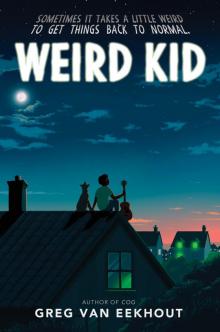 Weird Kid
Weird Kid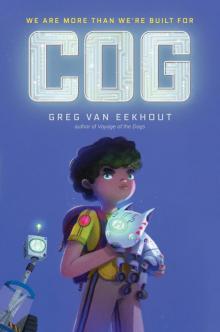 Cog
Cog The Boy at the End of the World
The Boy at the End of the World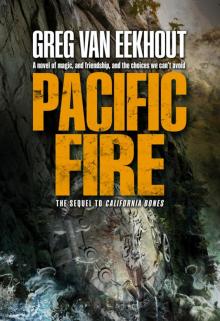 Pacific Fire
Pacific Fire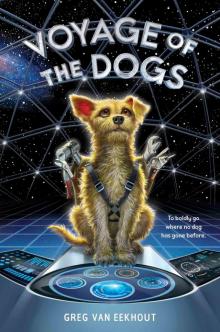 Voyage of the Dogs
Voyage of the Dogs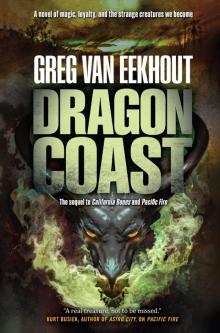 Dragon Coast
Dragon Coast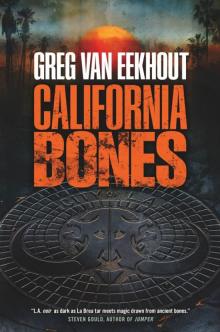 California Bones
California Bones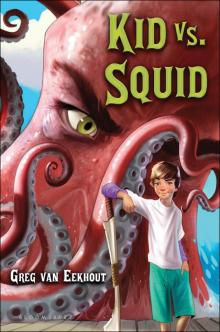 Kid vs. Squid
Kid vs. Squid